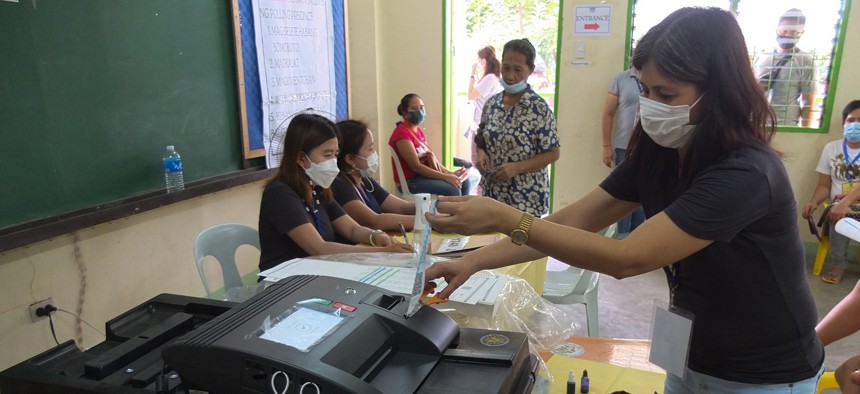Paper Shortage Threatens to Cause Election Problems

Getty Images

Connecting state and local government leaders
Troubles finding paper for ballots and other materials is just one of the challenges state election officials raised in testimony Thursday on Capitol Hill.
Some state elections offices are having such a hard time finding paper that they could face missing legal deadlines for mailing ballots and notices in the upcoming elections, experts told a Senate committee on Thursday.
“The paper shortage is pervasive. It’s across all materials required to conduct an election,” Tammy Patrick, a senior advisor on elections at the nonprofit Democracy Fund, told the Senate Rules Committee.
“Unless the situation is remedied, statutorily required elections mailings and notices may not go out in time,” said Patrick, who has been talking to elections officials and paper suppliers.
Paper is in such short supply that Louisiana Secretary of State R. Kyle Ardoin told the committee that his department has been contacting “every paper producer in North America—not just the United States—to ensure we have the supplies we need. Ardoin called on President Biden to use his Defense Production Act powers to order paper companies to prioritize supplying paper needed for elections.
“It our new baby formula issue,” said Sen. Roy Blunt of Missouri, the top Republican on the committee.
Patrick, formerly the federal compliance officer for the Maricopa County Elections Department who was appointed by President Obama to serve on the Presidential Commission in part because no new paper plant has been built in the United States since the 1980s.
The shortage worsened during the Covid-19 pandemic when paper companies focused on meeting the corrugated paper demand to ship products to homes, instead of producing as much high-quality paper needed to produce ballots.
“It’s not just ballots,” she said. “It’s postcards, poll worker training. It’s everything.”
Paper companies have urged elections officials to get their orders in early, she said. Still, “standard turnaround times have gone from a few weeks to many months,” she said. “It is now common for orders to be incomplete. Partial shipments, backorders and outright cancellations are becoming typical.”
Particularly hard hit are states that passed new voting laws that made the ballots and other elections materials they had on hand obsolete.
In part because of the shortage, Ardoin said Louisiana elections officials have been urging people to vote in person rather than by mail.
In addition, Pennsylvania’s acting Secretary of State Leigh Chapman said counties are struggling to pay to upgrade equipment to implement more voting by mail and guard against cybersecurity attacks.
Some were only able to afford equipment like scanners and mail openers because of foundation donations, she said.
“We need a consistent stream of federal funding,” she said.
More Legislation Proposed
Committee Chairwoman Sen. Amy Klobuchar, a Minnesota Democrat, saw her sweeping voting reform bill that would have undone election changes passed in conservative states blocked by Republicans and moderate Democrats in January. She said during the hearing she is taking a number of additional actions to try to help.
On Wednesday, Klobuchar and nine other Democratic senators introduced a bill to provide $20 billion in mandatory federal funding over the next decade to help states and local governments support election administration. Among other things, the Sustaining Our Democracy Act would provide funding to upgrade voting equipment and voter registration systems, expand voter registration and nonpartisan voter outreach, expand the number of polling places and the availability of early and mail voting, and promote cybersecurity.
The money also could be used to recruit, train and retain nonpartisan election officials and poll workers, and increase access to voting in federal elections for underserved communities, voters with disabilities, racial and language minority groups, military and overseas voters, and voters residing on tribal lands.
“This legislation helps provide state and local governments with the funding they need to effectively administer elections and eliminate barriers to voting,” Klobuchar said in a statement.
In addition, she and Blunt wrote the federal Elections Assistance Commission in April asking what it's doing to help states and localities deal with issues like the paper shortage and protecting election workers.
Klobuchar also said she had introduced the Protecting Election Administration from Interference Act last year that would have made it a federal crime to interfere with the counting of ballots and the certifying of elections.
Still Tackling Misinformation and Threats
Besides the paper shortage, elections officials told the committee that states also need additional funding, and more federal help combating disinformation and harassment and threats against elections workers.
“The accolades have waned and the high-fives for a job well done have ceased,” said Wesley Wilcox, the elections supervisor for Marion County, Florida. “Instead, they have been replaced by threats of violence against us or our families.”
“In normal times, voter worker recruitment is difficult and today it is nearly impossible,” Wilcox added.
Klobuchar noted that a Brennan Center poll of local elections workers in May found that 20% intend to leave their jobs before the 2024 elections. She noted that elections officials in Colorado have undergone active shooter training and bought bulletproof vests in response to threats they’ve received from those who believe the 2020 presidential election was stolen from Donald Trump.
Kery Murakami is a senior reporter for Route Fifty.
NEXT STORY: North Carolina House That Collapsed Into the Sea is a Warning for Millions of Americans



